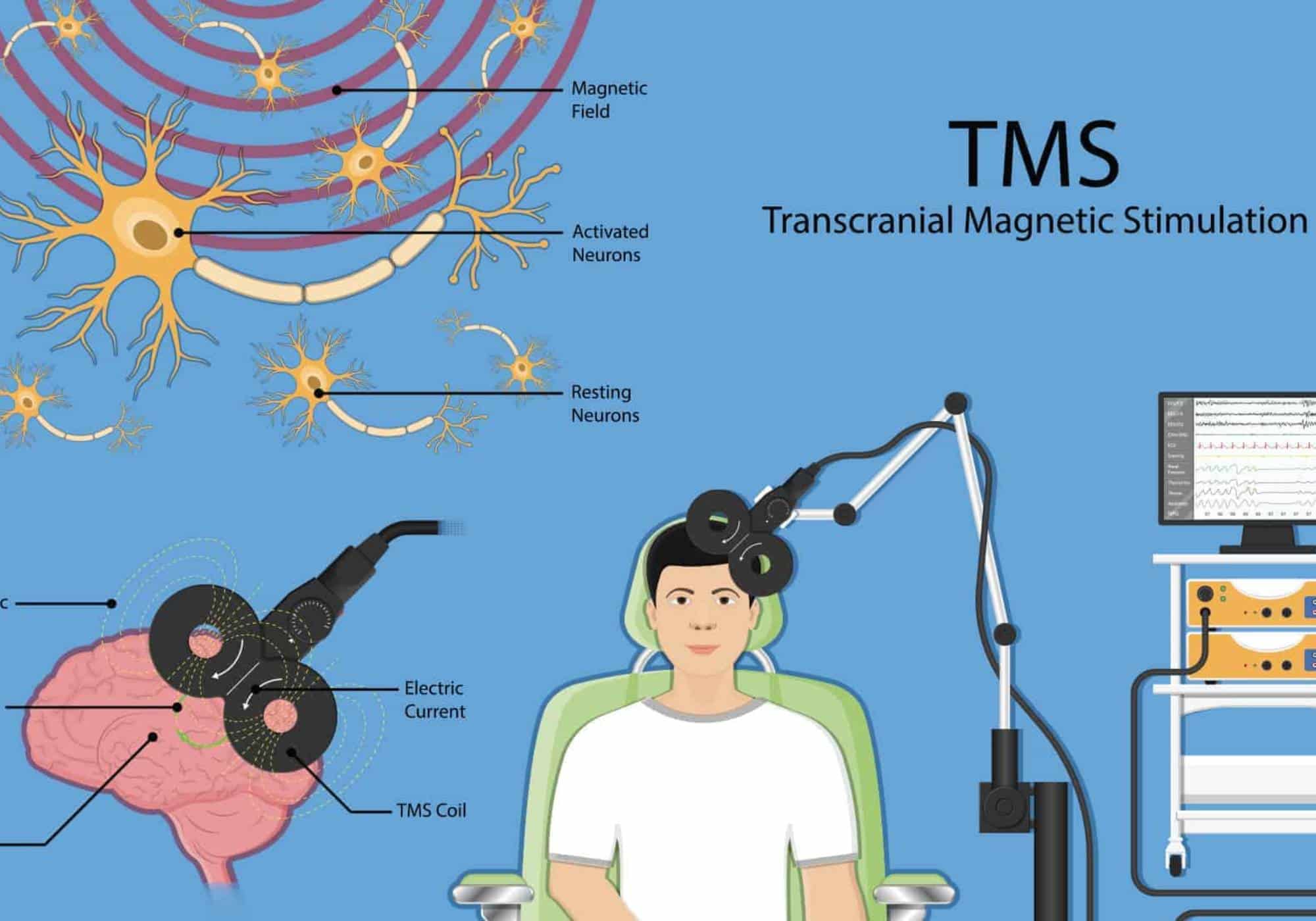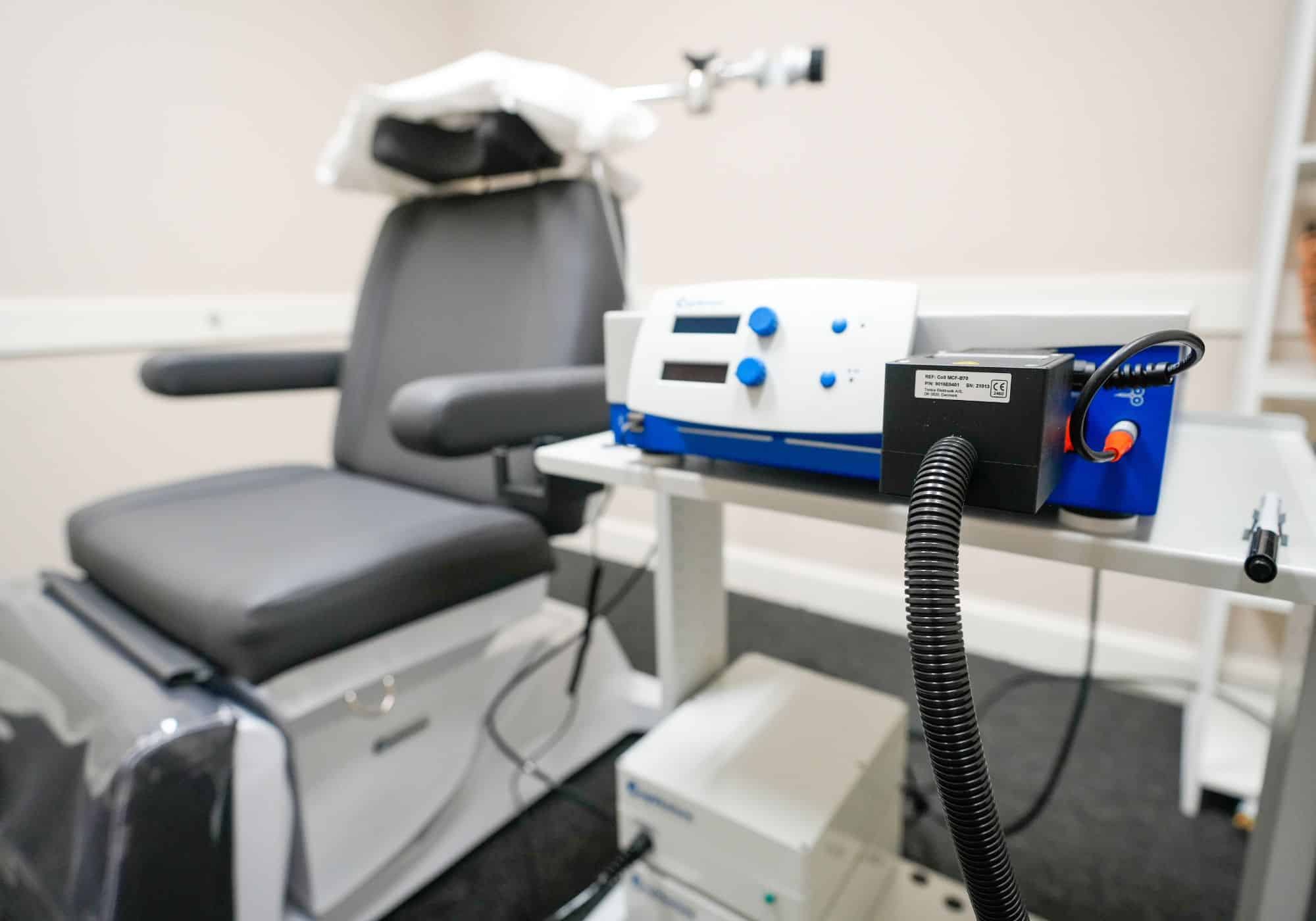Transcranial Magnetic Stimulation (TMS) is a cutting-edge therapy that uses magnetic fields to influence brain activity. This noninvasive method is particularly effective for treating mental health disorders such as depression and obsessive-compulsive disorder (OCD), especially in cases where traditional treatments have not been successful. TMS therapy is known for its minimal invasiveness and generally causes only temporary and mild side effects, presenting a viable alternative for those exploring options beyond standard treatments.
What Is TMS Therapy?
Transcranial Magnetic Stimulation (TMS) is a noninvasive, drug-free therapy that has been used effectively for over four decades to manage mental health issues including depression, anxiety, PTSD, and OCD. The therapy employs electromagnetic fields, similar to those used in MRIs, to target and stimulate underactive areas of the brain associated with these conditions.
At Hooked on Hope Mental Health, we prioritize a patient-centered approach to healthcare. Understanding the unique hurdles that mental health conditions present, and the limitations of traditional medication, our TMS therapy in Atlanta, GA, aims to encourage the growth of new neural connections, potentially easing the severe symptoms linked to various mental health disorders. During your consultation, our empathetic team will customize a treatment plan tailored to your individual needs to ensure you receive the most effective and personalized care.
Why Is TMS Therapy Done?
Transcranial Magnetic Stimulation (TMS) is offered as a noninvasive alternative for individuals who have not achieved success with conventional treatment methods. TMS therapy stands out because it is non-surgical and operates completely externally—without the need for incisions or anesthesia. This makes TMS an important option for patients seeking less intrusive treatments as opposed to more invasive procedures.
In the United States, the Food and Drug Administration (FDA) has approved TMS therapy for the treatment of the following conditions:
- Major Depressive Disorder (MDD), especially for cases resistant to other treatment methods.
- Obsessive-Compulsive Disorder (OCD).
- Migraines.
- Smoking cessation.
While these are the conditions officially approved for TMS treatment, research continues to investigate the therapy’s potential to help with a broader spectrum of neurological and psychiatric issues, such as:
- Alzheimer’s disease.
- Bipolar disorder.
- Borderline personality disorder (BPD).
- Chronic pain.
- Eating disorders.
- Essential tremor.
- Fibromyalgia.
- Parkinson’s disease.
- Post-traumatic stress disorder (PTSD).
- Schizophrenia.
- Stroke recovery.
- Tinnitus and auditory hallucinations.
- Traumatic brain injury.
These ongoing studies highlight TMS’s potential versatility and efficacy in addressing a wide array of severe health conditions, positioning it as a focal point in contemporary medical research and treatment strategies.
How TMS Therapy Works
Transcranial Magnetic Stimulation (TMS) therapy is a noninvasive outpatient treatment, typically conducted by a certified TMS technician or physician in a clinical setting. It does not require hospitalization, offering the convenience of no overnight stays and making it an accessible choice for many.
Preparation
Before beginning treatment, you will be asked to remove any items sensitive to magnets, such as jewelry, to ensure safety.
During the Session
- Hearing Protection: You will use earplugs to dampen the noise from the magnetic impulses, which sound like a series of clicks.
- Seating: You will be seated comfortably in a specific chair, fully awake and alert without general anesthesia.
- Setup: In your first session, the technician will measure your head to precisely position the magnetic coil and adjust the TMS machine settings based on your individual requirements.
- Application: The technician strategically places the coil over the front part of your brain to start the treatment.
- Sensations: You will hear clicking sounds and might feel a tapping sensation under the coil from the magnetic impulses.
Duration
Each session typically lasts between 30 to 60 minutes. You can drive yourself home and resume daily activities immediately after.
Frequency
A standard TMS therapy course lasts about 4 to 6 weeks, with sessions five days a week. The duration of treatment is customized based on your response and the condition being treated.
This structured protocol allows TMS therapy to effectively target and stimulate key brain areas involved in mood regulation and cognitive function, presenting a promising alternative for those seeking options beyond traditional treatments.

Benefits Of TMS Therapy
- Noninvasive and Convenient: TMS therapy is an outpatient procedure that doesn’t require anesthesia, allowing patients to undergo treatment and return to their daily routines immediately.
- Evidence-Supported Effectiveness: Extensively researched, TMS has proven effective in treating mental health disorders such as depression, anxiety, PTSD, and OCD, supported by substantial clinical evidence.
- Safe with Few Side Effects: TMS is generally well-tolerated, with the most common side effect being a temporary headache post-session, easily managed with over-the-counter medication.
- Personalized Treatment: At Hooked on Hope Mental Health, every TMS treatment plan is tailored to the unique needs of our patients, optimizing every treatment aspect to maximize therapeutic outcomes.
When Is Transcranial Magnetic Stimulation Used?
TMS is often considered for patients with depression who have not found relief through traditional treatments like antidepressants and psychotherapy.
It becomes a suitable option under these circumstances:
- You have tried one or more antidepressants without adequate relief from symptoms.
- You have experienced significant side effects from antidepressant medications.
- You are a child or teenager, more susceptible to the negative effects of antidepressants.
For younger patients, TMS is frequently recommended due to their increased sensitivity to drug treatments, offering a non-pharmaceutical approach to effectively manage depression.
What Are The Risks Of TMS Therapy?
Transcranial Magnetic Stimulation is known for its safety, having been refined through extensive research over the years. However, like any medical treatment, it carries some risks, though these are relatively rare.
The most severe risk is the potential for a seizure, which is exceedingly rare, occurring in about 0.01% of treatments, or approximately 1 in 10,000 sessions.
Other side effects are typically mild and short-lived, resolving soon after treatment.
These side effects can include:
- Headaches
- Dizziness
- Discomfort at the scalp or neck
- Temporary auditory issues, such as tinnitus or increased sensitivity to sound
- Tingling sensations in the face or head
These side effects usually do not last beyond the treatment session, allowing patients to quickly resume their normal activities with minimal disruption.
Does Insurance Cover TMS Therapy
TMS therapy is widely recognized by numerous insurance providers as an essential treatment option for individuals who have not found relief through traditional depression therapies. As a result, many insurance plans cover TMS treatments, though coverage depends on the specific terms and eligibility criteria of the patient’s insurance policy. This coverage reflects the established effectiveness and medical necessity of TMS therapy for eligible conditions.
TMS Therapy In Atlanta, GA at Hooked on Hope Mental Health
At Hooked on Hope Mental Health, we are dedicated to providing innovative treatments for those dealing with treatment-resistant depression or major depressive disorder. If you’ve not had success with conventional therapies, our TMS therapy in Atlanta, GA, might be the transformative step you need towards a better quality of life. Contact our outpatient mental health treatment center in Atlanta, GA, at 470-287-1927 or fill out our online contact form to learn more about how TMS Therapy could be the appropriate choice for you or your loved one.

